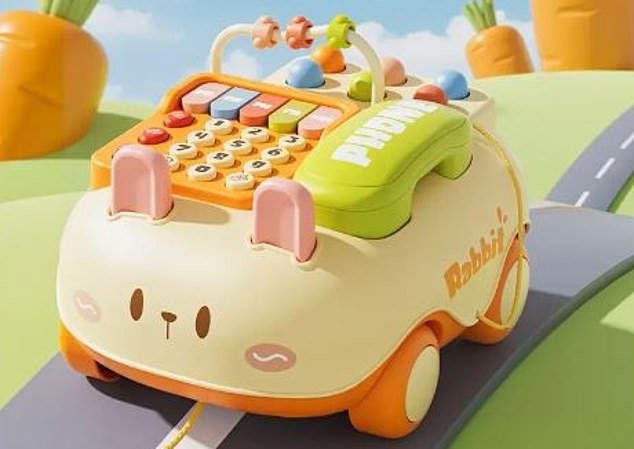Terrifying truth about Temu toys: from toxic chemicals, illegal products and even defects that can kill
Parents and grandparents buying toys for children through online marketplace Temu this Christmas are being warned by health and safety experts to be careful after research found some items pose serious health risks.
They are also advised to do some important checks on toys bought online to make sure they are safe before giving them to children on Christmas Day.
A growing number of shoppers are turning to the Chinese retail giant this year in search of bargain prices on everything from children’s toys to clothing.
Although the online retailer only arrived in Britain in April last year, it has already amassed an estimated 15 million users.
Temu stocks items from third-party sellers, mainly based in China, at extremely cheap prices. Although headquartered in Boston, USA, it is owned by Chinese e-commerce company PDD Holdings.
But while holiday shoppers may be enticed by attractive offers, they may encounter choking hazards, choking hazards and toxic chemicals in children’s items.
Bargains: More consumers are turning to Chinese retail giant Temu this Christmas in search of ultra-cheap deals on children’s toys
The British Toy & Hobby Association (BTHA) purchased five toys from Temu in October as part of an investigation. Of these, three were found unsafe and one was illegal.
A ‘simulation phone car’ sold on the Temu website could cause hearing damage or choking, BTHA found, while a stuffed dinosaur plush toy posed a potential choking hazard.
A set of magnetic building blocks purchased through the website was unsafe because it could lead to choking.
One item – a caterpillar bath toy – was deemed illegal. An item is considered illegal if it is incorrectly labeled due to an additional but inappropriate warning or if there are missing traceability labels.
Only one of the toys, an electric fire truck with lights and music, met the requirements and was considered safe.
Temu was not the only online retailer to sell items that pose a risk to children, according to the BTHA. Of the 75 toys she purchased from 11 different online marketplaces, she found that as many as 85 percent were unsafe and therefore posed a health and safety risk.
The toy did not meet safety standards or was missing safety warnings. Of the Temu products tested, 60 percent turned out to be unsafe.
It’s clear why the appeal of Temu in particular has increased this year, with some toys available for less than £1, and others costing a fraction of the cost of similar toys from popular retailers.
A mini basketball shooting toy is available for £2.07, while a similar one on Amazon costs £14.99. A wooden noughts and crosses set is available for 62 cents; on Amazon there’s a similar one for £15.99.
A smartwatch for kids sells for just £11.90; one from Smyths Toys Superstores costs £29.99. And it’s not just toys that are sold at attractive prices: a children’s hoodie costs €6.56, while a two-piece girl’s outfit costs just €4.62.
For comparison, a children’s hoodie from Marks & Spencer costs £14.
Research by consumer group Which? have also found items they believe are ‘dangerous’ being sold on Temu.
Last week, the country warned against buying toys on online marketplaces after discovering that products sold on websites could choke, cut or strangle a child.

Danger: This dinosaur plush has been determined to be a choking hazard. A Temu necklace, bought for £2.17, was found to contain ten times the amount of lead allowed under UK regulations
Temu wasn’t the worst offender as neither of the two toys. Which one? purchased and then tested posed a serious safety risk, but the consumer website exposed one of its toys as illegal.
The electrical labeling on the unnamed product did not comply with regulations and therefore cannot be legally sold in Britain.
The risk of giving Temu presents this Christmas goes beyond toys.
Some items sold through the marketplace contained dangerous levels of toxic chemicals, the Channel 4 Dispatches program found.
One of the items tested was a children’s jacket, purchased for € 11.09. It contained antimony – a silvery chemical element used to increase the hardness of alloys and brake parts.
But at high levels it can be harmful to the nervous system. A chain, bought for just £2.17, was found to contain ten times the amount of lead allowed by UK regulations.
To ensure you keep your loved ones safe when gifting toys purchased online, the BTHA advises that you should not assume safety checks have been carried out when purchasing from third party sellers via online marketplaces and that you research the company or brand before purchasing a product. toys.
It also suggests that if you buy branded toys from an online marketplace, you should compare the images and description with the brand’s own website; any discrepancies may indicate it is fake.
Also check who the seller is. Do they have a clear returns address and a track record of selling the type of item you are looking for?

Unsafe: This cute toy telephone car was considered a hearing hazard. Toys found on Temu were a fraction of the cost of similar toys from popular retailers
Adrian Simpson, head of policy at the Royal Society for the Prevention of Accidents (RoSPA) and former Trading Standards officer, adds that there are two main labels to look for when buying children’s toys: the CE or the UKCA label.
“Toys can only be sold to the public if they have one of these brands, so look for them,” he says.
Both the UKCA and CE marks can be used by companies to sell products in Great Britain.
“If a parent finds a toy-less toy, that’s a big red flag. Inform the retailer and trading standards,” Mr Simpson says.
‘But be careful, these marks could be counterfeit. Does the logo look out of proportion or a little wrong?’
‘Some very popular children’s products come at a high price, so everyone naturally wants to save money – but be wary if the product is too cheap. That could be a warning sign that it could be false.”
Check for poorly written instructions or no instructions, as this is another warning sign, Mr Simpson adds.
Kerri Atherton, head of public affairs at the BTHA, explains that there is a gap in the legislation that is allowing unsafe toys to appear on the market.
All toy manufacturers, importers and distributors – known as ‘economic operators’ – must follow the Toys (Safety) Regulations 2011 to ensure that products placed on the market are safe.
But online marketplaces selling third-party products have managed to avoid UK law.
They are not defined as economic operators and so have no legal responsibility to monitor the safety of items sold on their platforms, the BTHA says. Furthermore, third-party sellers are often based abroad, meaning they can bypass the jurisdiction of UK authorities.
Ms Atherton said: ‘We want to see this loophole closed and create a level playing field for all companies when it comes to placing toys on the market. It’s really scary to think that this is happening to children’s toys.’
A spokesperson for Temu said: ‘Like Amazon, AliExpress and eBay, Temu is a marketplace, allowing third-party sellers to sell their products around the world.
‘We take the security of products sold by these third parties very seriously and have a comprehensive audit, monitoring and enforcement process to ensure products comply with platform rules and regulatory requirements.
“If concerns are raised, we will immediately remove all affected product listings pending a thorough review.”
Levans@dailymail.co.uk
Some links in this article may be affiliate links. If you click on it, we may earn a small commission. That helps us fund This Is Money and keep it free to use. We do not write articles to promote products. We do not allow a commercial relationship to compromise our editorial independence.
